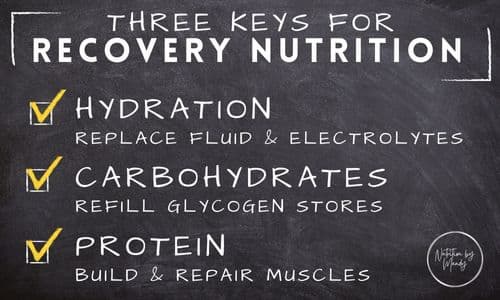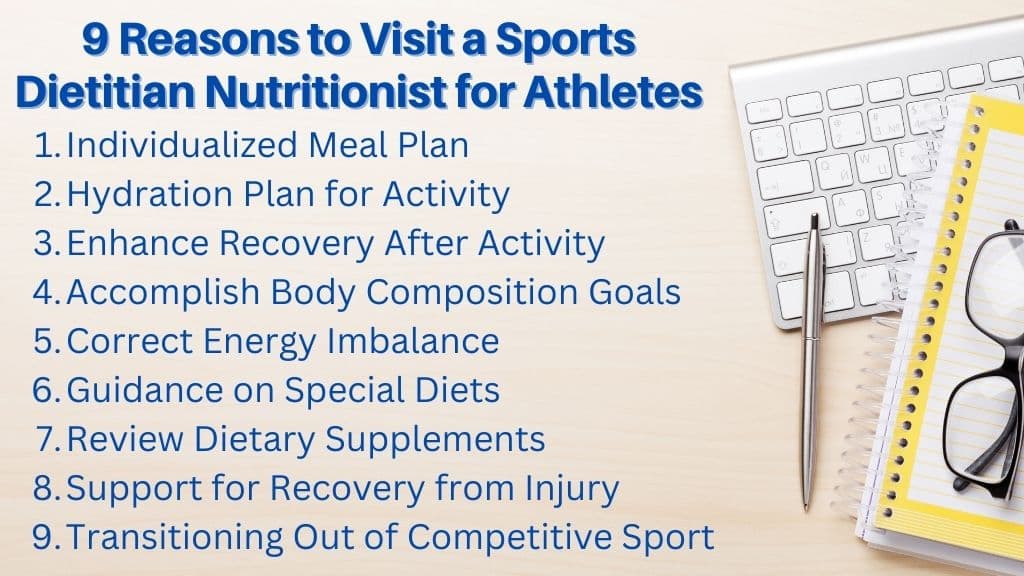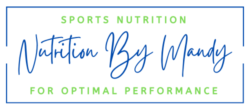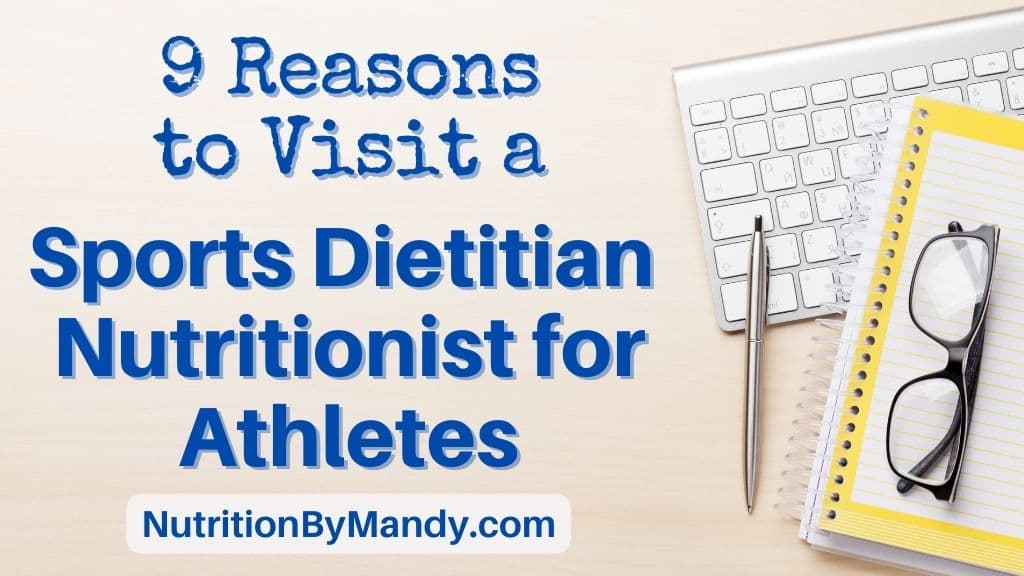9 Reasons to Visit a Sports Dietitian Nutritionist for Athletes
Sports nutrition is a key component in supporting athletes with achieving optimal health and performance. Consulting with a sports dietitian nutritionist can be beneficial to athletes in numerous ways.
Let’s take a look at the qualifications for a sports dietician nutritionist for athletes. Then we will explore 9 reasons athletes should consider visiting with a sports dietitian nutritionist to support their health and performance goals.
What are the Qualifications for a Sports Dietitian Nutritionist for Athletes?
According to the Academy of Nutrition and Dietetics, a Registered Dietitian Nutritionist (RDN) is a food and nutrition expert. To be credentialed as an RDN, an individual must have completed a minimum of a bachelor’s degree at an accredited college or university, participated in a 6-12 month supervised practice program (internship) in the field of dietetics, and passed a national registration examination.
Of note, in January 2024, the Commission on Dietetic Registration is changing the minimum degree requirement for a Registered Dietitian to be a graduate degree (Master’s or Doctoral degree).

Sports Dietitian Nutritionist for Athletes
Dietitians desiring to specialize in sports nutrition may seek out further certification from the Commission on Dietetic Registration as a Board-Certified Specialist in Sports Dietetics (CSSD). To qualify to sit for the CSSD exam, individuals must be a RDN with a minimum of two years of experience and have 2,000 hours of sports dietetics practice experience.
In the United States, the gold standard for a sports nutrition professional is a Registered Dietitian Nutritionist who is a Board-Certified Specialist in Sports Dietetics.
Registered Dietitian vs. Nutritionist
It is important to be aware that in the United States the generic term “nutritionist” is not regulated or credentialed in the same way as the term Registered Dietitian Nutritionist. This means that individuals may call themselves a nutritionist with limited (or no) formal education or training.
This difference in terminology can be confusing and misleading for athletes seeking sports nutrition guidance. Adding to the confusion, in other countries the credentialing requirements and recognized terminology differs from that used in the United States.
Thus, it is important when seeking out an individual to work with on your sports nutrition goals, to make sure you find a qualified professional. Take time to ask what certifications the individual holds as well as what experience the individual has working with competitive athletes.
Just as you seek out the best performance coaches and strength training programs, you want to ensure the nutrition guidance you receive will help take your performance to the next level.
Why Visit a Sports Dietitian Nutritionist for Athletes?
Let’s take a look at 9 reasons why meeting with a sports dietitian nutritionist for athletes can be beneficial.
#1 Individualized Sports Nutrition Meal Plan
It is important for athletes to have a sports nutrition meal plan in place to support both health and performance goals. Knowing what foods to eat and when, can help ensure athletes are fueled to train and perform at their best.
Nutrition needs of athletes vary based upon many factors, such as the type of sport played, in-season vs. off-season, as well as body composition and performance goals.
A sports dietitian nutritionist for athletes can develop an individualized meal plan to meet your specific needs. In addition, the sports dietitian can work with you on adjusting your meal plan throughout the competitive and off-seasons as nutrition needs change.

#2 Hydration Plans for Activity
Hydration is important for athletes to support both general health and sports performance. Even mild dehydration can negatively impact aerobic sports performance and cognitive function (1).
As dehydration becomes more severe, further decreases in performance are seen. In addition, dehydration increases the risk of heat illness, especially when exercising in a hot and humid environment (1, 2).
Individualized Hydration Needs of Athletes
It is important to note that individuals vary greatly in regard to the amounts of fluids and electrolytes lost in sweat during an exercise session. A study of NBA basketball players found that players lost a range of 1.0-4.6 L of fluid during a Summer League game (3).
In addition to variability in the amount of fluid lost during activity, the amount of sodium lost in sweat also varies. Some individuals are “salty sweaters,” losing higher amounts of sodium in sweat than other individuals.
Based on these differences in fluid and electrolyte losses, a sports dietitian nutritionist for athletes can assist you in developing an individualized hydration plan. The sports dietitian nutritionist can calculate your sweat rate for competition, provide tips for hydrating during activity, and ensure you have a plan in place that meets your specific needs.

#3 Enhance Recovery After Activity
Recovery nutrition is an important sports nutrition strategy, particularly when the amount of time between competitions is limited. For example, athletes who are participating in a tournament or who have back-to-back games should make recovery nutrition a priority.
Following activity, the goals of recovery nutrition include:
- Rehydrate: Replace the fluid and electrolytes lost in sweat
- Refuel: Replace carbohydrate energy stores used during the activity
- Repair: Consume protein to build and repair lean muscle mass
A sports dietitian nutritionist can work with athletes on a recovery nutrition plan that accomplishes all three of these goals. Through carefully planned post-workout snacks and well-balanced meals following an event, a sports dietitian can help ensure your recovery needs are met.

#4 Accomplish Body Composition Goals
It is not uncommon for athletes to desire making changes to their body composition. Athletes are often looking for strategies to increase muscle mass and decrease body fat. A sports dietitian nutritionist can help athletes focus on changes to their diets to support their body composition goals.
Athletes should avoid trying fad diets promising quick weight loss, as these diets are often hard to maintain over the long-term. Many diets restrict food groups and key nutrients that are necessary for both health and sports performance. In addition, the diets may result in the loss of lean muscle mass, which is not the desired outcome for athletes.
Conversely, athletes desiring to gain weight should do so in a healthy manner. It can be tempting to look to dietary supplements promising to result in immediate weight gain or the building of muscle mass.
However, since supplements are not well-regulated, this could result in the athlete inadvertently consuming a banned substance. In addition, it will not provide the nutrition foundation to support the athlete’s long-term athletic goals.
Regardless of the desired change in body composition, athletes should consult with a sports dietitian for a customized meal plan that can result in the desired weight loss or weight gain goals.
#5 Work with a Sports Dietitian Nutritionist for Athletes to Correct Energy Imbalance
Athletes participating in competitive sport often are expending a high number of calories through training and conditioning, sport competitions, daily activities, and energy needed for normal health, growth, and development.
When daily caloric expenditure from these activities exceeds dietary intake of calories from foods and beverages an imbalance occurs. We refer to this imbalance of calories as Relative Energy Deficiency in Sport or RED-S (4).
Relative Energy Deficiency in Sport (RED-S)
RED-S is associated with a syndrome of concerns having health impacts throughout the body. Low energy availability can negatively impact bone health, menstrual function, immune health, cardiovascular function, protein synthesis, metabolic rate, and GI function. In addition, it can disrupt normal growth and development and have negative impacts on psychological health (4).
Sports performance is also impacted by the caloric imbalance; decreasing muscle strength, endurance performance, and response to training. Underfueled athletes are also at an increased risk for injury and illness (4).
Meeting with a sports dietitian nutritionist for athletes is important for athletes struggling to intake adequate calories to support health, daily activity, and sports performance needs. A sports dietitian nutritionist can help identify ways to balance out your caloric intake and ensure all nutrient needs are met.

Disordered Eating
It is important to note that in some situations, disordered eating patterns are also contributing to the calorie imbalance. Disordered eating behaviors exist on a continuum ranging from occasional unhealthy eating and exercise behaviors to clinically diagnosed eating disorder (4).
Athletes anywhere along the continuum displaying disordered eating behaviors can benefit from meeting with a sports dietitian nutritionist A sports dietitian is a key part of the treatment team, working alongside a mental health professional to address the specific health and nutrition concerns of the athlete.
#6 Seek Guidance from a Sports Dietitian Nutritionist for Athletes on Special Diets
Athletes with special dietary needs or who follow specific dietary patterns can benefit from visiting with a sports dietitian nutritionist.
Athletes Following Plant-Based Diets
Athletes following a plant-based vegetarian or vegan diet, may be at risk of inadequate intake of key nutrients, such as protein, iron, zinc, omega-3 fatty acids, and Vitamin B12 (2).
A sports dietitian can assist the athlete with developing a meal plan that meets all of their nutrient needs from plant-based sources.
Athletes Following Gluten-Free Diets
Athletes that need to avoid gluten in their diet can also benefit from visiting with a sports dietitian nutritionist.
Gluten is a type of protein found in wheat and other grains such as barley and rye. Thus, athletes following a gluten-free diet need to ensure they are meeting their carbohydrate needs through other food sources.
A sports dietitian nutritionist can help identify gluten-free carbohydrate options, as well as the amount to consume to fuel your workouts and support your daily needs.
Athletes with Other Special Dietary Needs
Athletes with other food allergies, food sensitivities, who are picky eaters, or with other special dietary needs should consider meeting with a sports dietitian nutritionist to ensure they have a plan in place to support both health and sports performance.
#7 Reviewing Dietary Supplements
Dietary supplements are a multi-billion-dollar industry in the United States. Unfortunately, the Food and Drug Administration does not regulate dietary supplements in the same way that food is regulated.
Athletes need to use caution when considering taking a supplement. Supplements could potentially contain banned substances that are harmful to your health or that make you ineligible for competition (5).
A sports dietitian nutritionist for athletes can review dietary supplements and provide guidance on the safety and efficacy of sports supplements. The sports dietitian can also provide guidance on nutritional supplements that may provide a health or performance advantage based on your individual needs.
How Much to Take and When?
When taking supplements, it is important for athletes to ensure they are taking the right amount of the supplement at the right time. Some supplements are best taken prior to a workout, some post-workout, and some spaced throughout the day to avoid side-effects (i.e., beta-alanine itch or caffeine jitters). Thus, working with a sports dietitian nutritionist for athletes on the correct dose and timing of the supplement is beneficial.

#8 Sports Dietitian Nutritionist for Athletes – Provide Support for Recovery from Injury
It can be challenging for athletes to know what to eat when injured. Athletes may not feel like eating when injured or may believe a dramatic decrease in calories is necessary to compensate for not being physical active. For these reasons, working with a sports dietitian nutritionist for athletes is important when recovering from injury.
The sports dietitian nutritionist can develop a nutrition plan that ensures adequate calories are consumed to support the rehabilitation process. In addition, the sports dietitian will ensure no nutrient deficiencies occur that could impact healing.
During recovery from injury, the protein needs of athletes remain high to help prevent the loss of lean muscle mass. Understanding protein needs during injury as well as how to appropriately space protein intake throughout the day is important.
Injured athletes can rely on a sports dietitian nutritionist to put together a plan that meets their specific needs. This will allow the athlete to focus on the rehabilitation plan and get back to competition.
#9 Assist with Transitioning Out of Competitive Sport
Visiting with a sports dietitian nutritionist can be helpful to athletes when transitioning out of competitive sport. As athletes graduate from college or leave professional sports it can be a challenge to know what to eat with decreased activity levels.
Meeting with a sports dietitian nutritionist at this time can help athletes ensure they have a nutrition plan in place to support health and everyday activity.

Visit a Sports Dietitian Nutritionist for Athletes
Now that you understand reasons why visiting a sports dietitian nutritionist for athletes can be beneficial, consider scheduling time to meet with a sports dietitian. The Academy of Nutrition and Dietetics has a Find a Nutrition Expert locator on their website, which can help you conveniently locate Registered Dietitians in your area.
Also, take time to check out my blog: Your Guide to Game Day Nutrition. This blog will provide information to get you started on nutrition strategies to support optimal performance.
Click HERE to join the Nutrition By Mandy e-mail list. When you join you will receive a free athlete’s grocery list to print and take with you to the store.
About the Author
Mandy is a Sports Dietitian Nutritionist in the San Antonio, TX area. She is a Registered and Licensed Dietitian, a Board-Certified Specialist in Sports Dietetics, a Licensed Athletic Trainer, and is a Certified Exercise Physiologist through the American College of Sports Medicine. Mandy has experience working with athletes at the high school, collegiate, and professional levels. She believes the key to reaching one’s full potential, both in everyday life and in sports performance, relies on a healthy nutritional foundation. Learn more about the work Mandy does here.

